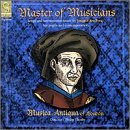| All Artists: Heinrich Isaac, Josquin Desprez, Jean Japart, Alexander Agricola, Adrian Le Roy, Anonymous, Alonso, Tylman Susato, Marbrianus de Orto, Hans Gerle, Antoine de Fevin, Adrian Willaert, Francesco Spinacino, Jheronimus Vinders, Musica Antiqua London Title: Josquin: Master of Musicians Members Wishing: 1 Total Copies: 0 Label: Signum UK Release Date: 9/19/2000 Album Type: Import Genres: Dance & Electronic, Special Interest, Pop, Classical Styles: Vocal Pop, Opera & Classical Vocal, Chamber Music, Historical Periods, Early Music Number of Discs: 1 SwapaCD Credits: 1 UPCs: 675754272524, 635212002520, 669910065563 |
Search - Heinrich Isaac, Josquin Desprez, Jean Japart :: Josquin: Master of Musicians
 | Heinrich Isaac, Josquin Desprez, Jean Japart Josquin: Master of Musicians Genres: Dance & Electronic, Special Interest, Pop, Classical
|
Larger Image |
CD Details |
CD ReviewsGems of Josquin's secular works in a lively performance Y.P. | Mount Messiaen, Utah | 05/19/2009 (5 out of 5 stars) "Josquin Desprez (sometimes spelled des Pres) was considered the greatest composer of his time (1440-1521), and his stature has never diminished ever since.(*) Among his limited surviving works, his masses are most thoroughly studied, and 16 of them have already been recorded.(**) This CD under review reveals another side of the great Josquin, and focuses on his secular output.
Let me declare my conclusion upfront: This CD is outstanding! Indeed, it's only by a stroke of luck that I decided to purchase this CD. I have never heard of the group Musica Antiqua of London,(***) and the provincial title "Master of Musicians" almost sent me away. (The producer should think more highly of the potential buyers!) However, I was lured by the last track, the only recording available of "Lementatio super morte Josquin des Pres" by Josquin's student Vinders, and decided to give it a try. A pleasant surprise as it turns out: I have listened to the CD straight, twice in fact. What's so attractive about this CD? First of all, the superb programming: It contains many of the Josquin's famous secular works, such as Mille regrets, El grillo, Adieu mes amours, and presents each alongside his contemporaries' settings of the same text. For example, there are 5 settings to the text of "Mille regretz" by Gerle, Josquin, an anonymous composer and 2 by Susato. Other composers featured in the disc are no less than Heinrich Isaac, Alexander Agricola and Adrian Willaert, among others. The inventive programming greatly enriches these otherwise short pieces, each ranging mostly 1-3 minutes. (There are no less than 37 tracks in this CD!) Secondly, the performance is quite enjoyable. It emphasizes liveliness and vivacity over the kind of refinement we commonly hear in recordings of Josquin's masses.(+) There are occasional minor intonation and articulation problems, but it hardly matters. The ruggedness actually adds to the liveliness and "joy of music-making!" Whether you are just about to climb the 16 summits of Josquin's masses or have already done so, this CD will greatly add to your listening pleasure. Highly recommended. "It has recently become a favourite intellectual game to compare Josquin's career with that of Beethoven. Essentially the point is that Josquin was as influential a composer in his time as Beethoven was in his; but the subplot is that Josquin ought to be taken as seriously as any later composer...." -- Peter Phillips --------------------------------- (*) A familiar story of Josquin illustrates his pre-eminence among the contemporary musicians. When Duke Ercole I d'Este sent his men in seeking of a new Maestro di Cappella at Ferrara in 1502, he got a report: "Isaac gets on better with his colleagues and composes new pieces more quickly. It is true that Josquin composes better, but he does it only when it suits him and not when you wish him to, and he is asking for a salary of 200 ducats, while Isaac will come for 120, but Your Lordship will decide...." Duke's choice? The great Josquin! (**) Among Josquin's surviving masses, 16 has been recorded: L'ami Baudichon, L'Homme Armé super voces, L'Homme Armé sexti toni, Ave Maris Stella, De Beata Virgine, Pange Lingua, Fortuna Desperata, Malheur me Bat, Mater Patris, Hercules Dux Ferrariae, La Sol Fa Re Mi, Sine Nomine, Ad Fugam, Gaudeamus, Di Dadi, Faysant Regretz. -- For recommended recordings by an expert I trust, see the comments below. (***) Musica Antiqua of London, led by Philip Thorby, consists of 3 other core members: John Bryan, Alison Crum and Roy Marks. They pride themselves of being able to perform multiple instruments (including recorders, viols and crumhorns). In this recording, they are joined by instrumentalists Jacob Heringman (lute, guitar, viol) and vocalists Jennie Cassidy (Mez), Belinda Sykes(A), John Potter (T) and Robert Evans (Bar). (+) It is educational to compare this CD with Ensemble Clement Janequin's CD Josquin: chansons. Two vastly different approaches with some overlaps of selection are both convincing." |

 Track Listings (37) - Disc #1
Track Listings (37) - Disc #1